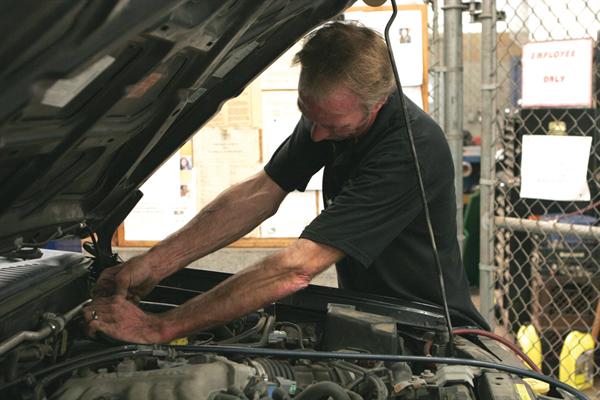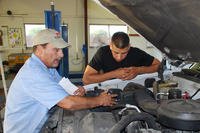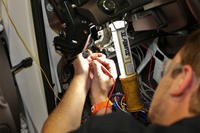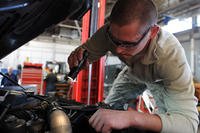Content provided courtesy of USAA.
While cars today are fairly advanced, you don't necessarily have to be a mechanic to know that something's wrong with one. You may not know how to fix the problem, but sometimes your car gives you clues to let you know the problems are there.
Sounds and other common symptoms can indicate bigger issues, and diagnosing them may help when it's time for a fix.
Start Your Engine … or at Least Try
When you turn the key to start your car, you expect the engine to come roaring to life. But sometimes, it just doesn’t. Your first thought might be that your battery is dead, but that may not always be the problem. If your engine takes longer to start or doesn’t start at all, you may want to seek professional help.
"I often see people replace what they assume is a dead battery, only to learn that the battery was just the victim of something else," says Donny Seyfer, of Seyfer Automotive, in Wheat Ridge, Colo., and chairman-elect of the Automotive Service Association. "Sometimes, dirty battery cables can overcharge or exhaust the alternator and keep the battery from reaching full charge."
Some auto parts stores, such as Advance Auto Parts® or AutoZone®, can test your battery, starter and alternator for free.
Help! Something's Leaking
Catching a leak early can help avoid bigger and more expensive problems down the road. Refill reservoirs and check levels every few days, but read the fine print on the container to make sure you're using the right fluid for your car. If the problem persists, contact your mechanic. Here are some things to watch out for:
| If the Leak Looks | The Problem Could Be |
|---|---|
| Clear or yellow | Brake fluid |
| Red or amber | Transmission or power steering fluid |
| Dark brown or black | Engine oil |
| Red, Pink, Orange, Yellow, Green or Blue | Cooling system or antifreeze |
"A lot of the cars we see in shops today are pretty smart," says Seyfer.
Most vehicles have On Board Diagnostics, a computerized system that notifies you of potential issues with your car. OBD sophistication levels range from basic to fully interactive. Common alerts can tell you when tire pressure is low or when it's time to change the oil. "If something's wrong, some cars can actually adjust their systems to help keep the car running," adds Seyfer.
For cars manufactured after 1996, diagnostic trouble codes are produced and stored by the car's OBD when it detects a malfunction. These codes can be accessed using a scanner that plugs into the car. A mechanic can use them to interpret problems, making it easier to accurately diagnose and recommend repairs.
If your car's computerized system is sending alerts, make note of any information you can. Refer to your owner's manual for more information. Call your dealer's service department or preferred mechanic to determine if the problem requires urgent attention.
Choosing a Mechanic
The best time to choose a mechanic is when you don't need one. These pointers can help you find the shop you trust:
Dealership service department. If you bought the car new, this is probably an obvious choice, especially if your car has a maintenance program. Give the service department a test drive with routine or minor services like oil changes or tire rotations. Build a relationship with a service advisor by asking to speak with the same person each time you call or visit.
Not impressed? Try someplace else.
Word of mouth. Per Seyfer, nearly 80% of after warranty automotive service is done outside of dealership service departments.
Recommendations from friends, family and neighbors, or online forums can help you find someone you can trust to work on your car. Some questions you may want to ask include:
- What kind of cars does the mechanic work on?
- How much did the mechanic charge?
- How long did the work take?
- What was the overall impression of the experience?
- Would they take their car there again?
Beware of One-size-fits-all Approaches
Seyfer suggests taking your car in for a checkup once or twice each year.
"A mechanic should ask questions to understand your driving habits," Seyfer says. "By understanding how you drive, he or she should be better able to recommend appropriate maintenance. And proper maintenance can help you maintain the life of your car."
You can test out a shop by taking your car in for an oil change. "Ask what type of oil the manufacturer recommends for your car," he says. "A good shop will either know or take the time to determine what your car needs. We're talking more than oil viscosity - 5w30 or 10w30, for example. If a shop is knowledgeable in these areas, they are keeping up with education."
"It's important that you do your homework too," he adds. "You don't have to be an expert, but it won't help if you don’t know what you're talking about."
Seyfer's verdict? "If a shop is competent in your repair needs, they are also probably a good choice for your maintenance," Seyfer says. "It helps to have only one service provider – for both maintenance and repairs. If there are problems, no one can point fingers."










